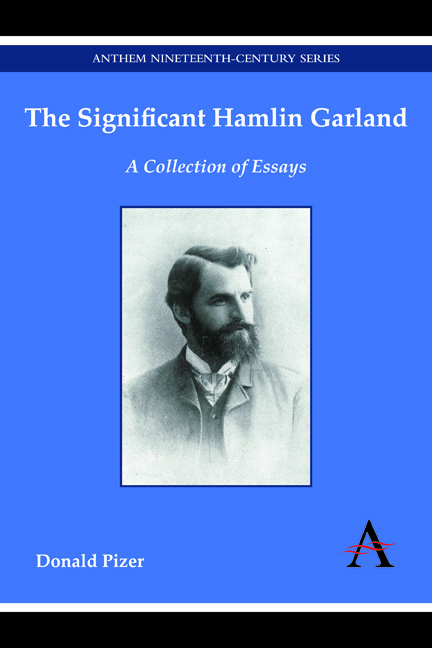Book contents
- Frontmatter
- Dedication
- Contents
- Preface
- A Selected Secondary Bibliography
- Editorial Note and Acknowledgments
- Part I THE RADICAL YEARS
- 1 Hamlin Garland in the Standard
- 2 Hamlin Garland and the Prairie West
- 3 Hamlin Garland and the Radical Drama in Boston, 1889–91
- 4 A Summer Campaign in Chicago: Hamlin Garland Defends a Native Art
- Part II THE MAJOR WORKS
- Notes
- Index
3 - Hamlin Garland and the Radical Drama in Boston, 1889–91
from Part I - THE RADICAL YEARS
Published online by Cambridge University Press: 05 November 2014
- Frontmatter
- Dedication
- Contents
- Preface
- A Selected Secondary Bibliography
- Editorial Note and Acknowledgments
- Part I THE RADICAL YEARS
- 1 Hamlin Garland in the Standard
- 2 Hamlin Garland and the Prairie West
- 3 Hamlin Garland and the Radical Drama in Boston, 1889–91
- 4 A Summer Campaign in Chicago: Hamlin Garland Defends a Native Art
- Part II THE MAJOR WORKS
- Notes
- Index
Summary
During the early 1890s, Boston was the scene of the earliest attempt to introduce the radical drama and independent theater into America – that is, a drama dealing with contemporary social and moral problems not usually presented on the stage, and a theater wherein worthy plays might be produced regardless of financial success. This attempt was significant, for it indicated the possibility and need for such a drama and theater and anticipated their later achievement and success on the American scene. It grew out of Hamlin Garland's production and publication difficulties with his A Member of the Third House in 1890, and James A. Herne's 1891 production of Margaret Fleming in a Boston hall. It culminated in the formation of the First Independent Theatre Association in 1891, but foundered – as has many another independent theater – on the rocks of precarious financial backing.
Hamlin Garland was the driving force behind both Herne's intense interest in the radical drama and the attempt to form an independent theater. It was Garland who stimulated Herne to write radical dramas. And it was in part Garland's inability to get his own radical plays a fair hearing which led him to initiate and play such a forceful role in the movement for an independent theater.
The stage was one of Garland's earliest interests. As a youth in Iowa he had played a leading role in amateur theatricals, and when he came to Boston in 1884, Edwin Booth's Shakespearean interpretations occupied him greatly.
- Type
- Chapter
- Information
- The Significant Hamlin GarlandA Collection of Essays, pp. 29 - 36Publisher: Anthem PressPrint publication year: 2014



